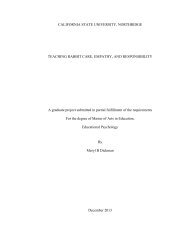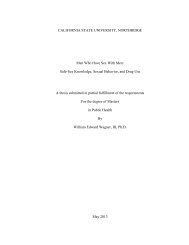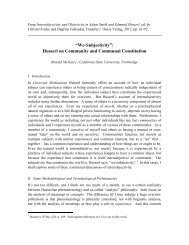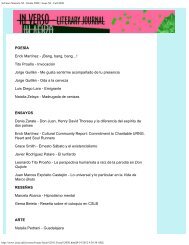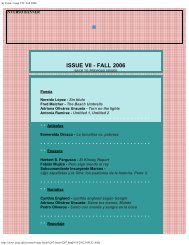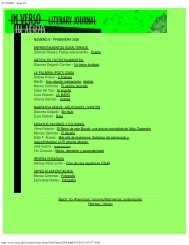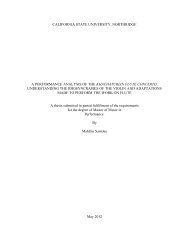2644 - CSUN ScholarWorks - California State University, Northridge
2644 - CSUN ScholarWorks - California State University, Northridge
2644 - CSUN ScholarWorks - California State University, Northridge
Create successful ePaper yourself
Turn your PDF publications into a flip-book with our unique Google optimized e-Paper software.
12 · Journal of Student Research Abstracts<br />
2661<br />
COLLEMBOLA IN CAPTIVITY.<br />
B. Arias and M. Mammary (teacher). William Mulholland Middle School, 17120 Vanowen St., Van Nuys,<br />
CA 91406.<br />
The purpose of this study was to determine if more than one family of Collembola could be found in the<br />
same area of the northwest garden at Mulholland Middle School, and to determine how long they can survive<br />
in captivity. My hypothesis was that many families of Collembola can be found at the same site and survive<br />
captivity.<br />
Collections were made from a 20cm. by 20cm. mapped area of the garden. Collembola was collected using<br />
the Tullgren funnel and looping techniques. Cultures were maintained in an activated charcoal and plaster of<br />
Paris base. Cultures were kept at room temperature and fed yeast and water as needed. Onichiuridae family<br />
was identified in one of the cultures, but they died after 24 hours in captivity. lsotomidae family was also identified<br />
but they are still alive after four weeks and they are active and reproducing. Eggs and youngsters can be<br />
identified. I conclude that my hypothesis was correct. Different families of Collembola were identified at the<br />
same site and I have successfully maintained cultures of Isotomidae in captivity.<br />
2262<br />
THE EFFECTS OF UlTRAVIOlET RADIATION ON CHLOROPLASTS IN<br />
EUGLENA AND ELODEA.<br />
Alex Vaynerman and B. Krieger (teacher), Pacoima Middle Schoot, 9919 Laurel Cyn. Blvd, Pacoima, CA<br />
91331.<br />
Objective. Our project's main purpose was to determine the effects on oxygen production when a concentrated<br />
UV source was used to bombard Euglena and Elodea organisms at 24, 48, 96, 192, and 384 hour increments,<br />
thus simulating the earth's futuristic conditions. Since all life on earth depends on the oxygen given off<br />
by. chloroplasts, and since 90% of the earth's oxygen comes from the oceans (which contain Elodea) we<br />
believed that this project would make a very outstanding contribution to our futures.<br />
Materials and Methods: We took use of the Euglena and Elodea and kept a control group of each under<br />
a growing lamp and an experimental group set in a box with a growing lamp and a UV light source of 300nm-<br />
400nm wavelengths. The Elodea was kept close to the surface of the pond water and the Euglena were kept in<br />
petri dishes with a wheat and rice medium. After each session we would count the number of chloroplasts in<br />
each organism by eye through a phase microscope. We originally tried using a spectrophotometer to determine<br />
the amount of oxygen being released by these chloroplasts, but early results proved to be too insignificant to<br />
support any results. Counting chloroplasts provided us with the best idea of the detrimental effects that UV<br />
light would have on organisms.<br />
Results: We found that there were severe reductions in the number of chloroplasts available for the Euglena<br />
and Elodea. The Euglena had a much greater loss in chloroplasts than the Elodea did, causing us to believe<br />
that Euglena might be more susceptible to UV radiation. Thus oxygen production decreased.<br />
Conclusion: Our results backed up our premises on the damaging effects that an ultraviolet ingested earth<br />
would have to face in the coming decades. Our world as a whole will face staggering losses in oxygen as well<br />
as life if the polluted trends continue to wreak havoc on the ozone layer. Our project was able to prove that in<br />
a futuristic condition with more UV light in the atmosphere, which is the way trends are continuing right now,<br />
life will have an immensely difficult time surviving.



